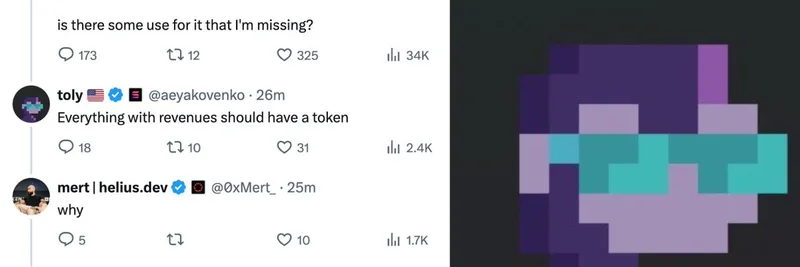In a recent exchange on X that caught the attention of the crypto world, Solana co-founder Anatoly Yakovenko, known as @aeyakovenko, shared his straightforward view on tokenization. Responding to a question from Mert Mumtaz of Helius.dev about why a wallet might need its own token, Yakovenko stated, "Everything with revenues should have a token." When pressed for more, he added, "So then the profits could be returned to token holders."
This conversation, highlighted by @DegenerateNews, underscores a growing trend in the blockchain space where projects are increasingly exploring ways to distribute value back to their communities through tokens. For those new to the term, tokenization refers to creating a digital asset (a token) on a blockchain that represents ownership or a share in something—like profits from a project.
The Context Behind the Buzz
Mert's query stemmed from curiosity about the utility of tokens for everyday tools like crypto wallets. Wallets, such as Phantom or Solflare on Solana, handle transactions and store assets but often generate revenue through fees or partnerships. Yakovenko's response suggests that if a project makes money, issuing a token could align incentives by sharing those earnings with users and holders.
This idea isn't entirely new in crypto. Revenue-sharing models have powered successes like GMX on Arbitrum, where token holders benefit from trading fees. On Solana, known for its high-speed, low-cost transactions, this could supercharge the ecosystem. Imagine meme token projects that actually generate revenue—through NFT sales, decentralized apps, or even viral marketing campaigns—distributing profits to holders. It could turn speculative memes into something with real economic backing.
Why This Matters for Meme Tokens
Meme tokens often thrive on hype and community, but sustainability is a challenge. Yakovenko's perspective could inspire meme creators to build revenue streams, like integrating with decentralized finance (DeFi) protocols or launching merch lines, then tokenize to reward loyal holders. This shifts memes from pure speculation to mini-economies.
For instance, if a meme project racks up ad revenue from its viral content, a token could let holders claim a slice. It's a way to foster long-term engagement, reducing the "pump and dump" stigma that plagues the space. Solana's ecosystem, with tools like Pump.fun for easy token launches, is perfectly positioned for this.
Community Reactions and Implications
The post from @DegenerateNews sparked immediate reactions. Some users cheered the idea, seeing it as a path to "tokenize everything," while others questioned if it might lead to oversaturation or regulatory hurdles. One reply joked about onboarding Web2 companies to Web3, highlighting the potential for broader adoption.
From an SEO standpoint, this ties into hot searches around Solana meme coins, revenue models in crypto, and the future of tokenomics. If you're a blockchain practitioner, consider how this applies to your projects: Does your dApp generate fees? Could a token enhance user retention?
As the Solana ecosystem evolves, ideas like Yakovenko's could bridge the gap between fun memes and functional finance. Keep an eye on emerging projects that adopt this model—they might just be the next big thing in the meme token world.


